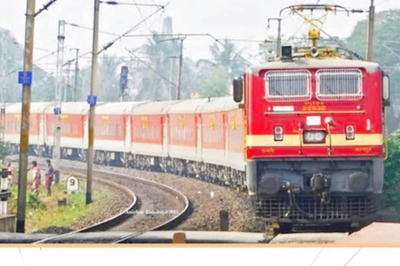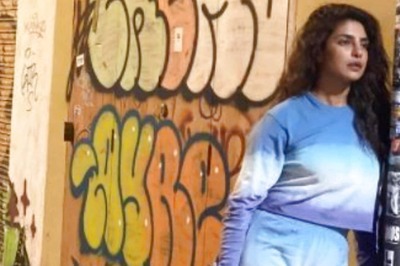
views
New Delhi: Every election season, politicians across parties make long, glorious speeches on women’s safety and empowerment. And every election season, the same politicians turn stingy when it comes to fielding women candidates.
It was similar in Gujarat too. Out of the 1834 candidates who were fighting the elections, only 122 were women. That’s not even 7 percent of the total candidates filed. And among these 122 women, only 22 were fielded by the BJP and the Congress. BJP gave tickets to 12 women candidates, Congress gave it to only 10. In the end, 13 women ended up winning from those 22 candidates.
Rashmi Bahuguna, who runs an organisation called Suresh Bhakti Foundation that helps in children’s education, didn’t get a ticket from either of the two biggest parties, despite repeated pleas. The 48-year-old woman who ran the contest independently from the Gandhinagar constituency said that despite working for years at the grass root level, neither of the parties thought she is worthy of a ticket.
“I went to Amit Shah’s house, his PA stopped me. He asked me to come back the next day. When I went back, he asked me to leave again,” she said. Bahuguna said that despite having a sick father at home who she has to take care of, and very little money in hand, she fought the Gujarat elections only because she wanted to bring a change. Bahuguna had reached out to the Congress party as well, emailing him repeatedly. “But, he never responded,” she said.
Bahuguna teaches poor kids, offers free meals to them that she cooks herself and has done several campaigns against tobacco.
Bahuguna feels that while the politicians talk about “women empowerment”, they don’t believe in “women representation”. “They will never back women without a political clout. The speeches on empowerment are all a farce,” she added.
Even as women account for 47.80 per cent voters, their representation by the two biggest political parties was 1.19 percent.
While politicians seek women votes in every election, it backtracks when it comes to giving them to real power. What happens to 'Bharat Mata' and 'Ganga Mata' during election? Do the parties feel women candidates don’t win?
Well, the numbers prove that women candidates have a good success rate when it comes to winning elections.
During the last state elections in 2012, BJP fielded 20 women candidates. Out of which, 13 won the election. The same year former Gujarat chief minister Anandiben Patel contested and won from the Ghatlodiya constituency with a margin of more than 175,000 seats which was the highest in that election.
This year, 13 women won out of the 22 candidates fielded by the Congress and the BJP. That’s a success rate of 59 percent.
While women in local self-government bodies had benefitted with 50 percent reservation, that isn’t the case when it came to state elections. Zankhana Patel, who has won from the Choryasi constituency with 173882 votes said that she believes more women in politics would mean improvement in work. “Women do their work very sincerely. Most of us are preempt at handling work at home and outside with equal dedication,” Patel said.
Patel, who’s a mother of two, entered politics in the last assembly elections after her father passed away. “I am an accidental politician,” she said. The BJP leader wants to create more jobs for women in both rural and urban areas.
However, when asked why the BJP didn’t field enough candidates, she said, “Maybe they thought it would be the right decision for the party.”
Chandrikaben Chhaganbhai Bariya, the Congress leader who won from Garbada, expressed disappointment over the few women who were fielded. “This isn’t a good thing, we definitely need more women leaders,” she said. Urmila Bhagat, who contested independently from Mangrol (ST) in Surat, agreed. Bhagat, too, didn’t get a ticket from either of the parties despite meeting the leaders several times. “They don’t want women candidates,” she said.
Ashaben Patel, who won from the Ujha constituency, said, “There aren’t enough women who want to enter politics. If there are strong women leaders, the parties won’t hesitate in giving ticket.”
Shweta Brahmbhat, however, feels that the responsibility also lies with the women politicians, and not just the party leaders. Brahmbhat, who contested from the Congress party from Maninagar constituency in Ahmedabad, said, “My responsibility is to encourage and bring more women in politics.” Brahmbhat, who used to be an investment banker and now works in a management consultancy firm, said that more women voters need to made aware. “Women voters form half the population, so shouldn’t there be enough representation?” she asked.
Recently, in the Uttar Pradesh election, 34 women went on to become MLAs in the 312 member Legislative Assembly. When the BJP claimed that this is the largest number of women MLAs for any party in UP since Independence, they were not wrong.
But guess what? Despite this number, women are under-represented in both the BJP and the UP assembly. The proportion of women MLAs in the UP assembly continues to be around 10%, and has not crossed 10% since Independence, according to data compiled from Election Commission of India and Association for Democratic Reforms (ADR).
Here are the women MLAs from Gujarat.

















Comments
0 comment